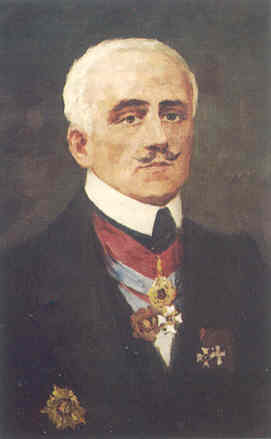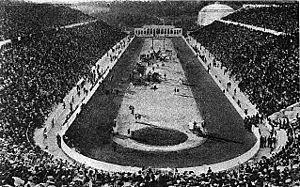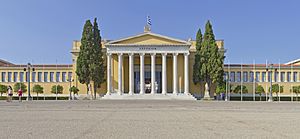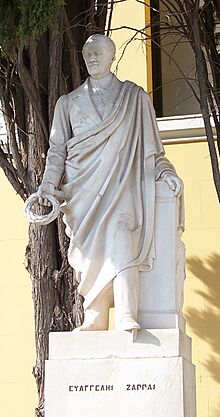Evangelos Zappas facts for kids
Quick facts for kids
Evangelos Zappas
|
|
|---|---|

An 1860 portrait of Zappas
|
|
| Native name |
Ευάγγελος Ζάππας
|
| Nickname(s) | Evangelis (Ευαγγέλης) |
| Born | 23 August 1800 Labovo, Pashalik of Yanina, Ottoman Empire in present-day Albania |
| Died | 19 June 1865 (aged 64) Broșteni, United Principalities of Moldavia and Wallachia in present-day Romania |
| Buried |
|
| Allegiance | First Hellenic Republic |
| Service/ |
Hellenic Army |
| Battles/wars |
|
| Relations | Konstantinos Zappas (cousin) |
| Other work |
|
Evangelos Zappas (born August 23, 1800 – died June 19, 1865) was a Greek businessman and a very generous person, known as a philanthropist. He spent most of his life in a country called Romania. Today, he is remembered as one of the people who helped start the modern Olympic Games.
Zappas organized Olympic Games in 1859, 1870, 1875, and 1888. These games happened even before the International Olympic Committee was created. His money, along with his cousin Konstantinos's money, also helped fund the very first modern Olympic Games in 1896.
When he was young, Zappas fought in the Greek War of Independence (1821–1832). He became a Major in the army. After Greece became independent, he moved to Wallachia (part of modern Romania). There, he became a very successful businessman and one of the richest people in Eastern Europe. Zappas was the main person who paid for the Olympic Games to start again. He also gave money to build many Greek schools and sports places.
Contents
Biography
Early Life and Military Career
Evangelis Zappas was born on August 23, 1800, in a village called Labovo. This area was part of the Ottoman Empire at the time, in what is now Albania. He did not go to school when he was a child. At 13, he joined the army of a local ruler.
In 1821, Zappas joined a secret Greek group called Filiki Eteria. This group wanted to free Greece from Ottoman rule. He fought in the Greek War of Independence. He became a Major in the army and was friends with a famous captain named Markos Botsaris. Zappas fought in several big battles, like the first siege of Missolonghi. He was wounded five times during the war.
Life in Wallachia and Business Success
In 1831, Zappas moved to Wallachia, a region in present-day Romania. He became very rich by buying and selling land and farming. By the 1850s, he was one of the wealthiest business owners in Eastern Europe. When he died in 1865, he had a huge amount of money.
Bringing Back the Olympic Games
The idea of bringing back the ancient Olympic Games had been discussed for many years. People were inspired by old Greek traditions. In 1833, a poet named Panagiotis Soutsos suggested that the Games should be revived in the new country of Greece.

Zappas was very inspired by Soutsos's idea. In 1856, he wrote a letter to King Otto of Greece. He offered to pay for the Olympic Games to be held again. He also offered cash prizes for the winners.
Some Greek politicians did not like this idea. They thought sports games were old-fashioned. But a newspaper article by Panagiotis Soutsos made Zappas's offer public. King Otto then agreed to have sports competitions every four years. These would happen at the same time as industrial and agricultural shows. Zappas gave the Greek government money to create a special fund for the Olympics.
On November 15, 1859, the first modern Olympic Games were held in a city square in Athens. These were the first modern games with roots in ancient Greece. The athletes competed in events like running, discus, javelin throwing, wrestling, and jumping.
Zappas left a lot of money in his will to pay for future Olympic Games. He wanted them to be held at the Panathenaic Stadium. He died in 1865. His huge fortune was used to build permanent sports facilities in Athens. It also helped continue the Olympic Games. He also asked for the Zappeion exhibition and conference center to be built. This building is named after him and his cousin Konstantinos Zappas.
Legacy
Founding the Modern Olympic Games
After Zappas died, the Panathenaic Stadium needed to be fixed up again. This was because the Greek government had not followed Zappas's instructions to use marble. His cousin, Konstantinos Zappas, continued Evangelos's work. He made sure the Games kept going and helped build the stadium with marble.
In 1870, the new stadium was ready. It could hold 30,000 people. It hosted the second Zappas Olympics. These games were much better organized. More athletes and events were included. The first modern Olympic building was also built to support the games. This building, the Zappeion, was paid for entirely by Zappas's money. It officially opened on October 20, 1888.
People from other countries were inspired by Zappas's efforts. Dr. William Penny Brookes from the United Kingdom added some events from the 1859 Athens Games to his own sports events. Later, Baron Pierre de Coubertin from France was inspired by Dr. Brookes. He went on to create the International Olympic Committee in 1894.
A professor named David C. Young said that without Zappas, the Athens Games of 1896 might not have happened. Zappas's actions and his will made Crown Prince Constantine of Greece a supporter of the Olympic Games. This happened even before the International Olympic Committee was formed.
Philanthropic Contributions
Evangelos Zappas was a great philanthropist. He gave money to help people in many ways. He helped start schools, libraries, and other places across the Ottoman Empire. He especially helped his home region of Epirus. Greek schools were built and improved in many villages and towns. In Constantinople (modern Istanbul), he funded schools for children of all ages. These were known as the Zappeion Institute. He also gave money for Greek farming students to study in Western Europe.
Some of the buildings he funded were damaged in 1955.
Zappas also gave money to the Romanian Academy in Romania. There is a statue of him there today. He was a strong supporter of Greek culture. He funded projects like a history of Romanians and a Romanian dictionary. He also paid for a newspaper and books in the Albanian language in Romania.
Personality and Resting Place
Evangelis Zappas was often described as a quiet and unique person. He did not have children. But he was also a man with a clear vision and strong determination. He was a true patriot who understood how important his actions were. His cousin, Konstantinos Zappas, made sure Evangelis's generous work continued after his death.
Zappas wanted to be buried first in Romania, where he lived most of his life. But four years later, his bones were moved. They were reburied in the courtyard of the school in Labovo, where he was born. His skull was placed under his memorial statue outside the Zappeion in Athens, Greece. A ceremony was held for this on October 20, 1888. Baron Pierre de Coubertin also had his heart buried at Olympia, a similar gesture. In Labovo, there is an old tombstone that says in Albanian: "Here lie the bones of the philanthropist Evangelis Zappas."
See also
- Manthos and Georgios Rizaris
- Georgios Sinas
- Simon Sinas
- Petros Zappas
- Zosimades
 | William L. Dawson |
 | W. E. B. Du Bois |
 | Harry Belafonte |



